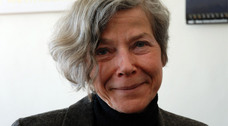2009-07-31

For Ellen Corin, PhD, the past 27 years in Montreal have spanned psychology and anthropology, the West and the developing world. There is one unifying element through her career, it is that it was not her own, but other people's stories that were important.
The adventure begins
For her Doctorate she left the cozy confines of Belgium for the isolated villages of Zaire – now the Congo – to study the role of the father in the matrilineal Yansi peoples. She mastered their language to speak to the men and women of the villages, and learn how they saw themselves in relation to the rituals, sorcery and family relations that governed their lives. "We were looking for bridges between modern Western medicine and traditional medicine," she explains.
Discovering Québec… and the Douglas
In 1979, she accepted an appointment at Université Laval's laboratory of social gerontology. Her work there introduced her to Quebec culture and society, while her participation in GIRAME (Interuniversity group for research in medical anthropology and ethnopsychiatry) brought her to the attention of Gaston Harnois, MD, who convinced her to join the team at the Douglas. She was hired at the Douglas under N.P. Vasavan Nair, MD, and set about establishing the Psychosocial Research Unit. It was at this time that her research – still international in flavour - began to move towards schizophrenia. "I was very free at the Douglas," says Ellen, "I'm very grateful for their tolerance for my not always regular inquiries."
The "revolving door" of schizophrenia
At the time, she explained, a large proportion of all schizophrenia patients admitted to Quebec's hospitals would end up being readmitted within months. "There was this revolving door of people in and out of the hospital. I wanted to find what is helping these patients remain in society? What is pushing them back?" Ellen explains that at the time, conventional thinking held that schizophrenic patients with strong social networks – engaged families and close friends – would integrate into society better than their more isolated peers. She noted, however, that many schizophrenics would frequent parks, street corners, and even cafés, where they were in society, but not forced to engage in it.
Parallel to this work, she was participating in studies in Abitibi, Brazil, sub-Saharan Africa and India on mental illness and community life. Fundamentally, she was trying to find how patients with mental illness saw their own experience, and how other members of their society reacted to them, in order to adjust local programs for them. The prognosis for schizophrenic patients is better in some countries than others; for example, Ellen Corin believes India's strongly religious environment can be a boon for patients there. But whatever her insights and wherever she worked, Ellen made absolutely certain to work within the support systems as they were, without imposing her methods on the communities.
"Les Impatients"
With her emphasis on relying on her patient's self-expression to understand their needs, it was natural that Ellen has, in recent years, become involved with "Les Impatients," a centre that encourages mentally ill patients to express themselves through art. "The experience of mental illness is universal, and the experience of psychosis is universally frightening, she says. Studying schizophrenia, in a wide-ranging, global way does not just to help us understand the illness, but ourselves. In looking in a deeper way at psychosis and what can it teach us about us, we learn about the tragic dimension of what it means to be human."
Mark Reynolds


